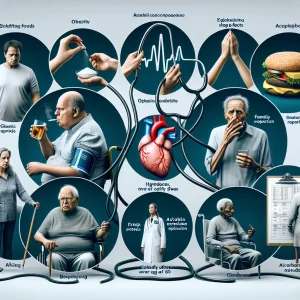Understanding High Blood Pressure: The Silent Killer and Its Implications
High blood pressure, commonly known as hypertension, is a widespread health condition impacting millions of adults globally. Many individuals may be unaware that they have high blood pressure, as it typically presents with few or no symptoms. This lack of awareness can be perilous, as untreated hypertension often leads to severe health complications, including heart disease and stroke. Consequently, regular blood pressure screenings are vital to monitor your levels and maintain them within a healthy range, ensuring proactive health management.
Implementing small yet meaningful lifestyle changes can significantly enhance your ability to manage blood pressure effectively. Simple modifications, such as incorporating a nutritious diet filled with fruits, vegetables, and whole grains, along with ensuring adequate sleep, can have a profound effect on maintaining your blood pressure within healthy limits. These positive lifestyle alterations not only contribute to improved cardiovascular health but also promote your overall well-being and vitality.
 The Significance of Blood Pressure: How It Affects Your Health
The Significance of Blood Pressure: How It Affects Your Health
Blood pressure is the measure of the force that circulating blood exerts against the walls of your blood vessels, primarily influenced by the heart's pumping motion. This essential measurement indicates how efficiently blood circulates throughout your body and the resistance it encounters within your arteries. Maintaining a healthy blood pressure level is vital for overall health, as elevated readings can lead to serious complications affecting various organs.
Blood pressure is expressed in millimeters of mercury (mmHg) and is composed of two critical components:
- Systolic Pressure – This is the first and higher number, representing the pressure in your arteries when your heart contracts and pumps blood.
- Diastolic Pressure – This is the second and lower number, indicating the pressure in your arteries while your heart is at rest between beats.
For example, a reading of 120/80 mmHg indicates a systolic pressure of 120 and a diastolic pressure of 80, which is generally regarded as normal and healthy.
Understanding the Causes and Risks Associated with High Blood Pressure
High blood pressure can stem from numerous factors, often linked to narrowing arteries that increase blood flow resistance. This heightened resistance may cause blood pressure levels to rise, exerting excessive strain on critical organs, such as the kidneys, heart, brain, and eyes. Over time, unmanaged hypertension can escalate to severe health issues, particularly cardiovascular diseases, which can be life-threatening.
While blood pressure can vary due to a multitude of factors, healthcare professionals categorize readings based on established guidelines:
Low blood pressure – 90/60 mmHg or below
Normal blood pressure – Ranges from 90/60 mmHg to 120/80 mmHg
High blood pressure – 140/90 mmHg or higher
A reading between 120/80 mmHg and 140/90 mmHg indicates a potential risk of developing hypertension in the future. However, it's essential to acknowledge that individual blood pressure norms can differ, making it imperative to consult with a healthcare provider for personalized guidance.
 Exploring the Various Contributing Factors to High Blood Pressure
Exploring the Various Contributing Factors to High Blood Pressure
High blood pressure doesn't have a singular cause; instead, it results from a combination of various risk factors. Some of the most significant contributors include:
- Being overweight or obese
- Smoking
- Consuming a high-salt diet
- A family history of hypertension
- Excessive alcohol consumption
- Lack of sleep
- Inadequate physical activity
- Aging, particularly over 65
- Being of Caribbean or African descent
Many of these risk factors can be modified through lifestyle changes. In rare cases, high blood pressure may result from underlying medical conditions or certain medications, affecting approximately 1 in 20 individuals. Conditions that may contribute to hypertension include:
- Thyroid disorders
- Kidney diseases
- Diabetes
- Use of steroids
- Hormonal contraceptives
- Recreational drugs, like cocaine
Recognizing the Hidden Symptoms of High Blood Pressure
One of the significant challenges posed by hypertension is that it often manifests without noticeable symptoms, leaving many individuals unaware of their condition. In the UK, approximately 25% of adults are estimated to live with undiagnosed high blood pressure. The most reliable method to assess your blood pressure status is through regular testing.
You can have your blood pressure checked at various locations, including:
- Your GP’s office or by a healthcare professional—simply request a blood pressure assessment.
- Many local pharmacies offer blood pressure checks.
- Some workplaces provide health screenings that include blood pressure measurements.
- At home, using a personal blood pressure monitor for regular self-assessments.
 Practical Strategies to Effectively Lower Your Blood Pressure
Practical Strategies to Effectively Lower Your Blood Pressure
Recognizing that lifestyle factors play a crucial role in high blood pressure, adopting effective strategies can significantly reduce your risk. Here are four essential approaches you can implement:
Engage in Regular Physical Activity
Integrating regular exercise into your daily routine is vital for maintaining your heart and blood vessel health, which aids in lowering blood pressure levels. Carrying excess weight can put a strain on your heart, making it work harder to pump blood throughout your body. By incorporating physical activity into your lifestyle, you can shed excess weight and enhance your cardiovascular fitness, both of which are beneficial for lowering blood pressure and improving overall health.
Adopt a Heart-Healthy Diet
Focusing on a well-balanced diet that prioritizes whole foods—such as fruits, vegetables, and lean proteins—can greatly contribute to lowering blood pressure. Given that salt is known to elevate blood pressure levels, reducing your salt intake is essential. The NHS recommends limiting salt consumption to less than 6g per day, roughly equivalent to one teaspoon. Aim to decrease your intake of processed foods that are high in salt and use herbs and spices to enhance the flavor of your meals instead.
Limit Alcohol Consumption
Reducing both the quantity and frequency of alcohol consumption can play a crucial role in managing blood pressure levels effectively. Introducing alcohol-free days into your week and spacing out drinking occasions can be beneficial for your health. Although the NHS suggests a maximum of 14 units of alcohol per week—equivalent to 7 pints of 4% ABV beer or 7 glasses of 175ml wine—it's important to note that reaching this limit consistently is not necessary for everyone.
Prioritize Quality Sleep
Consistently poor sleep patterns can elevate the risk of developing high blood pressure. The NHS recommends aiming for 6 to 9 hours of quality sleep each night to support overall health and maintain normal blood pressure levels. Establishing a calming bedtime routine and creating a sleep-conducive environment can greatly enhance your sleep quality, contributing to better health outcomes.
Presented By: Private Blood Pressure Tests
The Article Blood Pressure Test Explained: What You Need to Know Was Found On https://limitsofstrategy.com





Comments are closed